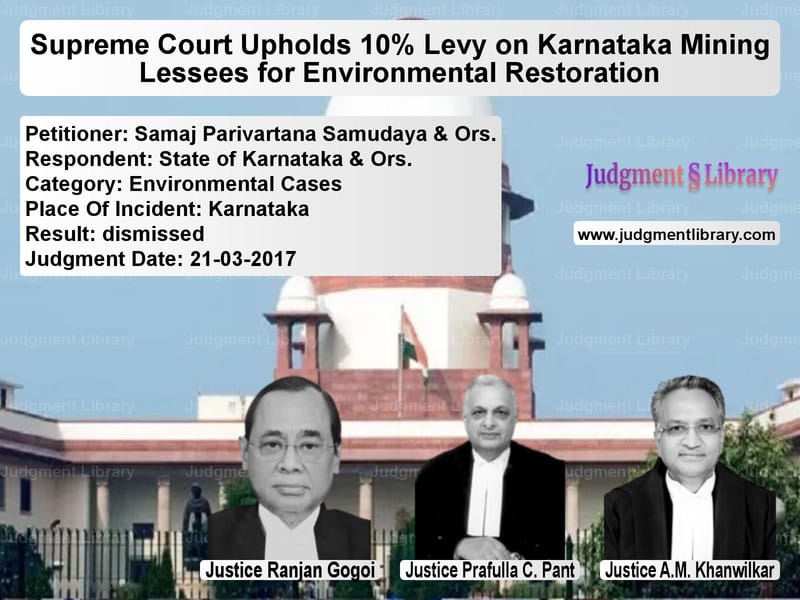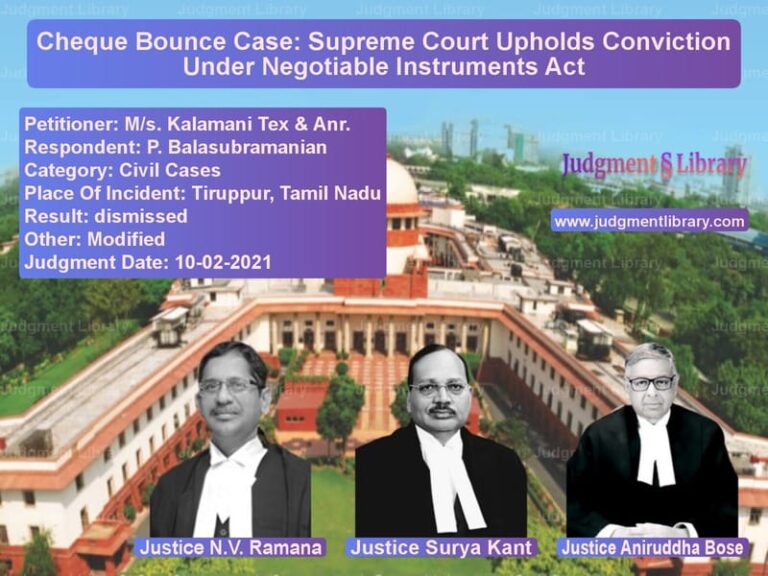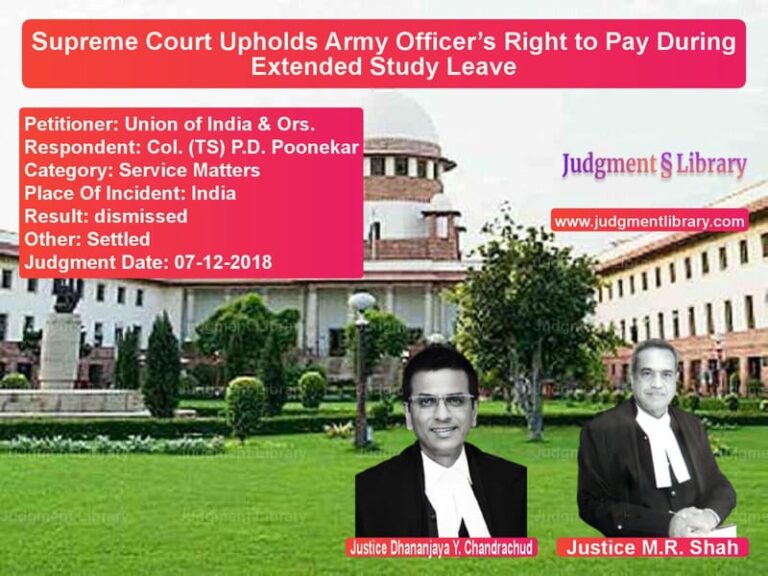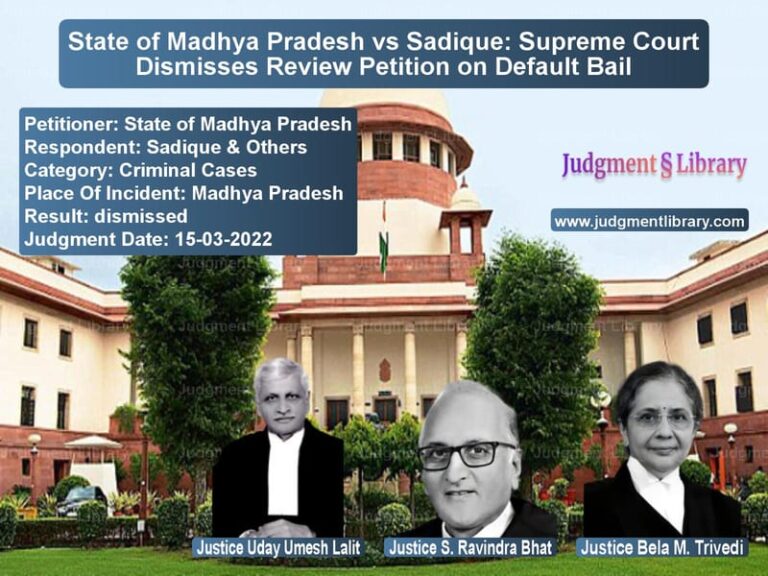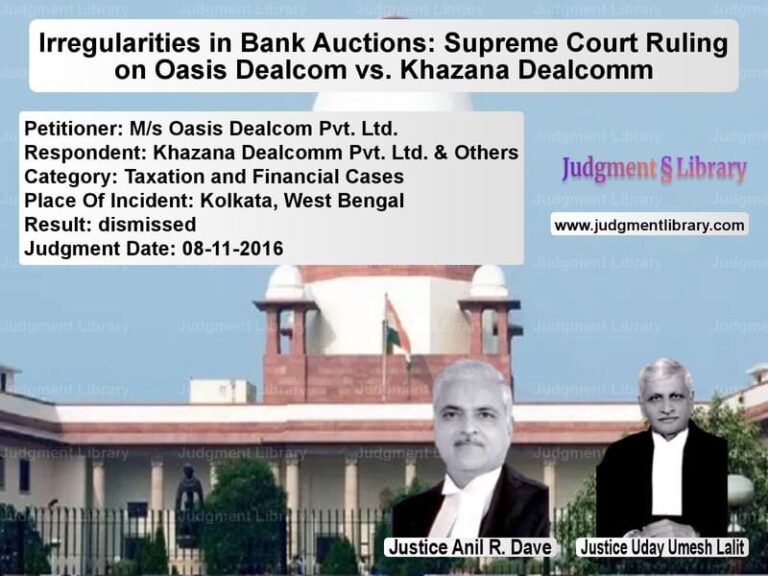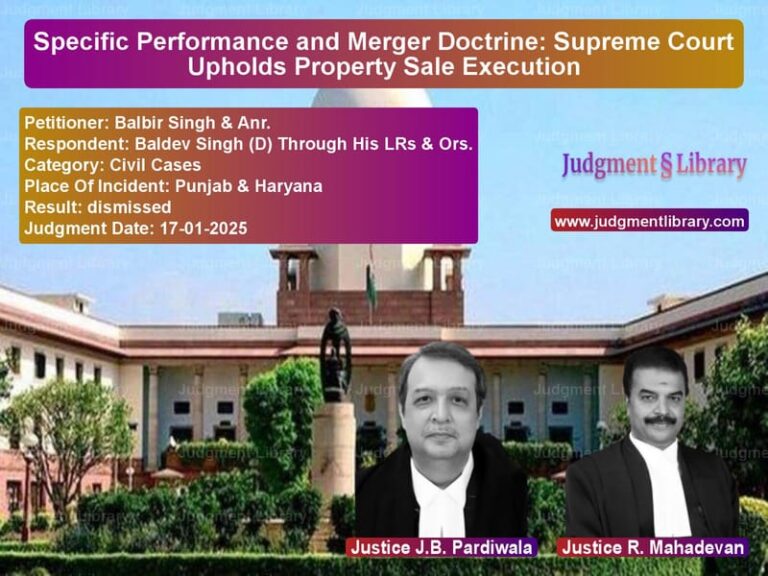Supreme Court Upholds 10% Levy on Karnataka Mining Lessees for Environmental Restoration
The Supreme Court of India, in Samaj Parivartana Samudaya & Ors. vs. State of Karnataka & Ors., addressed a dispute concerning the mandatory 10% contribution from mining sale proceeds to a Special Purpose Vehicle (SPV) for environmental restoration in Karnataka. The Court dismissed the mining lessees’ plea to discontinue this levy, ruling that the funds were essential for repairing the environmental damage caused by illegal mining in Bellary, Chitradurga, and Tumkur districts.
Background of the Case
The case originated from large-scale illegal mining activities in Karnataka, which caused severe environmental degradation. In response, the Supreme Court had previously mandated that 10% of the sale proceeds of iron ore from these districts be contributed to a Special Purpose Vehicle (SPV) to implement a Comprehensive Environment Plan for Mining Impact Zone (CEPMIZ). This SPV, the Karnataka Mining Environment Restoration Corporation (KMERC), was tasked with executing restoration and rehabilitation projects.
However, following the enactment of the Mines and Minerals (Development and Regulation) Amendment Act, 2015 (MMDR Act), which introduced a new District Mineral Foundation (DMF) requiring mining lessees to contribute up to 30% of the royalty, the Federation of Indian Mineral Industries (FIMI) argued that this new statutory contribution should replace the 10% levy.
Key Legal Issues
- Whether the 10% levy for environmental restoration should continue after the introduction of the DMF.
- Whether mining lessees should be exempted from the dual financial burden of contributing to both the SPV and the DMF.
- Whether the objectives of the SPV and the DMF were identical, making the separate levy redundant.
Petitioner’s Arguments (FIMI & Mining Lessees)
The mining lessees, led by FIMI, contended:
- With the enactment of the MMDR Amendment Act, 2015, lessees were now required to contribute up to 30% of their royalty to the DMF.
- The DMF was established to address the adverse effects of mining on local communities, making the additional 10% contribution to the SPV unnecessary.
- The SPV’s functions overlapped with those of the DMF, meaning lessees were being unfairly charged twice for the same purpose.
- Continuing the 10% contribution would create financial hardships for lessees and discourage legal mining activities.
Respondents’ Arguments (Union of India & State of Karnataka)
The Union of India and the State of Karnataka opposed the lessees’ plea, arguing:
- The SPV was a unique court-mandated mechanism designed specifically to repair the extraordinary damage caused by illegal mining in Karnataka.
- The DMF, created under the MMDR Act, was a general fund applicable nationwide, whereas the SPV was a targeted initiative addressing a unique environmental crisis in Karnataka.
- Allowing lessees to stop contributing to the SPV would undermine the restoration efforts initiated by the Court.
- The funds collected by the SPV were separate from the DMF and were necessary to complete long-term rehabilitation projects.
Supreme Court’s Observations
The Supreme Court thoroughly examined the differences between the SPV and the DMF:
- The DMF was created under a statutory framework to address general mining-related impacts, while the SPV was a judicially created entity specifically designed to address the unprecedented environmental devastation caused by illegal mining in Karnataka.
- The Court had already approved the CEPMIZ, a Rs. 15,742.35 crore project funded primarily through the 10% levy.
- The CEPMIZ included long-term projects such as reforestation, air and water quality restoration, infrastructure development, and sustainable livelihood programs.
The Court stated:
“The necessity of the SPV is not obviated by the introduction of the DMF. The funds collected by the SPV serve a distinct purpose in Karnataka, responding to a crisis that was unprecedented in scale and impact.”
Supreme Court’s Ruling
- The Supreme Court dismissed the mining lessees’ plea and ruled that they must continue to contribute 10% of the sale proceeds to the SPV.
- The Court emphasized that the SPV was necessary for environmental restoration and that its funding could not be substituted by contributions to the DMF.
- The Karnataka government and the Central Empowered Committee (CEC) were directed to ensure the full implementation of CEPMIZ projects.
Key Takeaways from the Judgment
- The ruling upholds the principle that environmental restoration requires sustained and dedicated funding.
- The Court reinforced that judicially mandated environmental reparations cannot be diluted by subsequent legislation.
- The judgment ensures that mining lessees contribute to both the national framework (DMF) and the Karnataka-specific environmental restoration fund (SPV).
Conclusion
The Supreme Court’s ruling in Samaj Parivartana Samudaya vs. State of Karnataka underscores the importance of environmental accountability in the mining sector. By affirming the continuation of the 10% levy for the SPV, the Court ensured that the rehabilitation of Karnataka’s mining-affected regions remains a priority. This judgment serves as a precedent for balancing economic interests with environmental sustainability, reinforcing that mining companies must bear the cost of restoring the lands they have exploited.
Don’t miss out on the full details! Download the complete judgment in PDF format below and gain valuable insights instantly!
Download Judgment: Samaj Parivartana Sa vs State of Karnataka & Supreme Court of India Judgment Dated 21-03-2017.pdf
Direct Downlaod Judgment: Direct downlaod this Judgment
See all petitions in Environmental Cases
See all petitions in Public Interest Litigation
See all petitions in Legislative Powers
See all petitions in Judgment by Ranjan Gogoi
See all petitions in Judgment by Prafulla C. Pant
See all petitions in Judgment by A M Khanwilkar
See all petitions in dismissed
See all petitions in supreme court of India judgments March 2017
See all petitions in 2017 judgments
See all posts in Environmental Cases Category
See all allowed petitions in Environmental Cases Category
See all Dismissed petitions in Environmental Cases Category
See all partially allowed petitions in Environmental Cases Category

